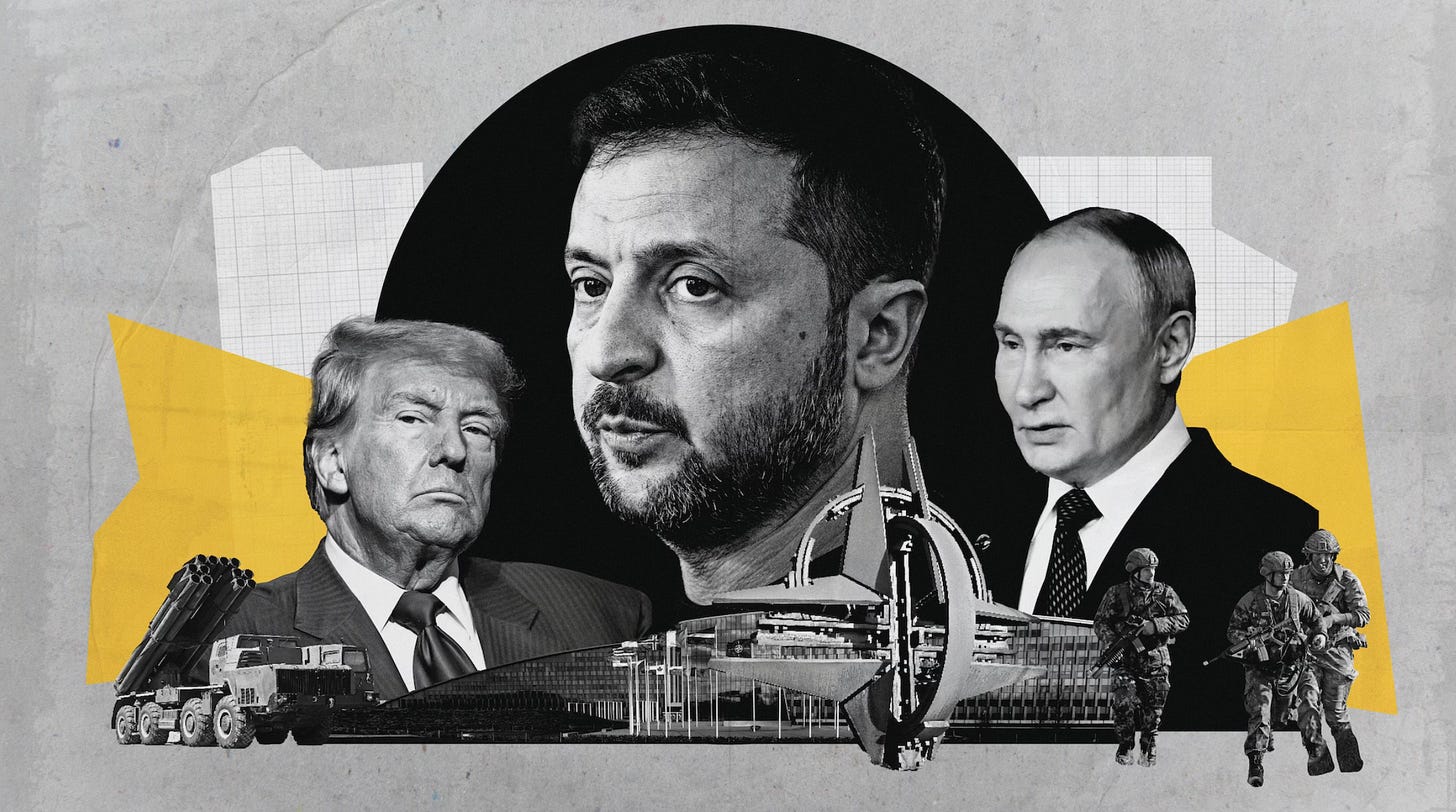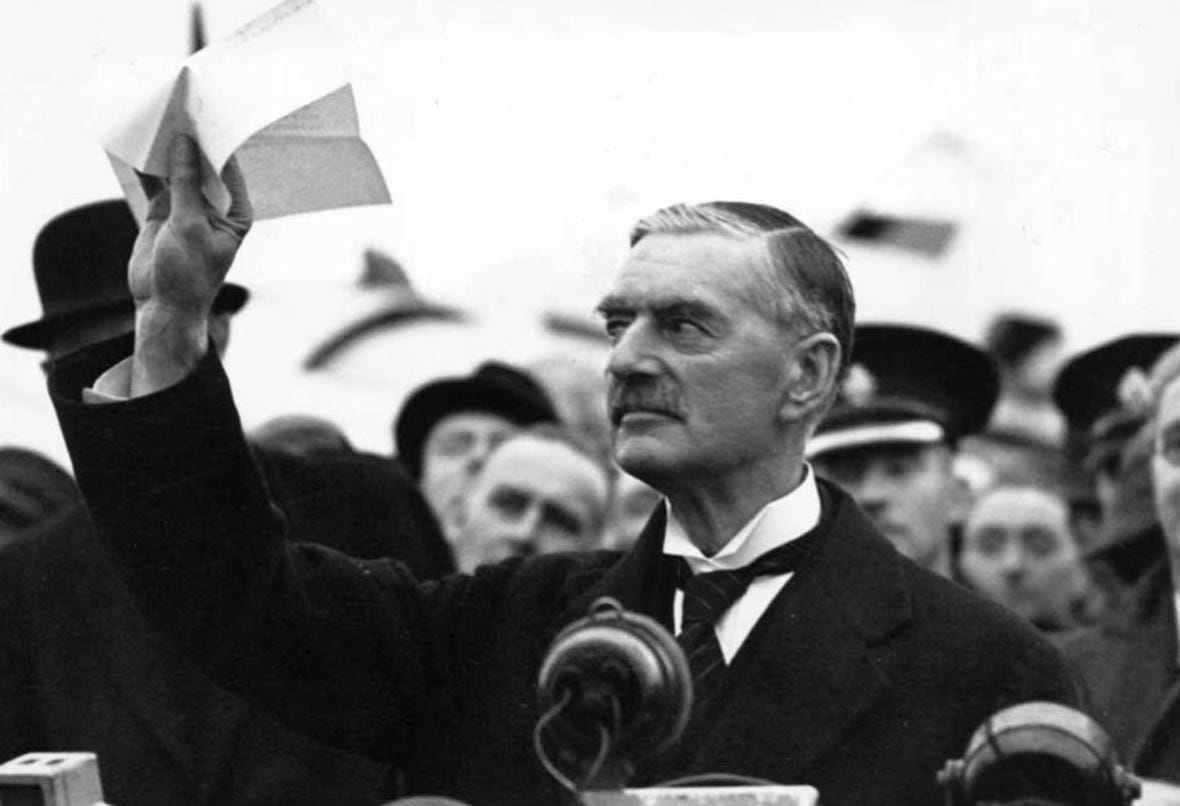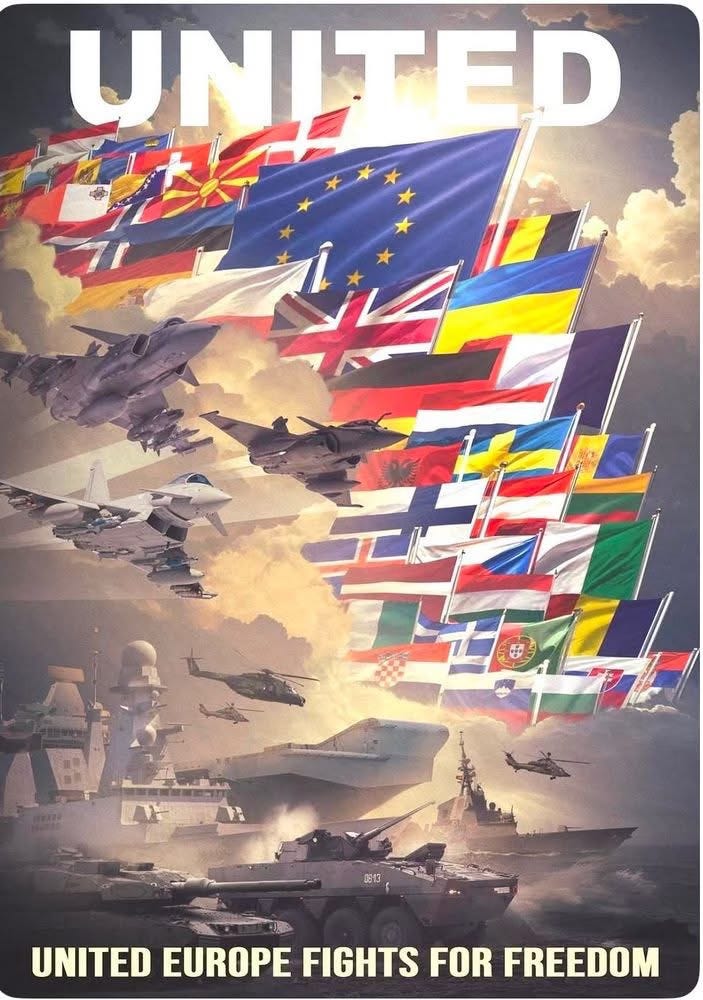History is filled with moments of decision, turning points where inaction leads to catastrophe. Europe faces one such moment today. As Russia’s war against Ukraine enters its third year, the continent stands at a crossroads. It can either stand firm with Ukraine, securing its own future in the process, or allow hesitation and fatigue to seal Ukraine’s fate as a fractured, occupied, and subjugated state.
This is not simply about Ukraine’s sovereignty. It is about the survival of the European security order itself. If Ukraine is abandoned, it will not just mark the end of a sovereign nation - it will represent the failure of European democracy, the collapse of NATO’s deterrence, and the beginning of an era where brute force dictates the fate of nations.
For a brief moment, after Russia’s full-scale invasion in 2022, the West seemed to understand the stakes. The United States and Europe provided weapons, intelligence, and economic support that helped Ukraine defy Putin’s expectations. But three years on, Western unity is faltering, and a new political reality has emerged.
Donald Trump has returned to power, and his administration is shifting U.S. foreign policy away from supporting Ukraine. The U.S. has gone from leading the defence of Ukraine to actively undermining it, with Trump questioning whether America should remain in NATO at all.
With the U.S. retreating from its role as a global power, Europe now faces a choice of its own. Ukraine’s survival depends on Europe. And Europe’s future depends on Ukraine.
The Munich Precedent: Appeasement and Its Consequences
The events unfolding today echo a dark chapter in European history. In 1938, under the guise of protecting ethnic Germans in the Sudetenland, Adolf Hitler demanded that Czechoslovakia cede significant territory to Nazi Germany. Britain and France, desperate to avoid another war, capitulated. The Munich Agreement, signed in September 1938, transferred the Sudetenland to Germany without resistance. British Prime Minister Neville Chamberlain returned to London proclaiming, “peace for our time” (Taylor, 1961).
That peace lasted less than six months. Hitler soon occupied the rest of Czechoslovakia, proving that concessions only embolden aggressors. The illusion that war could be avoided through appeasement was shattered when Germany invaded Poland in September 1939, launching the Second World War. By failing to act when Hitler could have been stopped, the West ensured a far greater and more devastating conflict (Kershaw, 2007).
A striking similarity exists between Hitler’s justification for dismantling Czechoslovakia and Vladimir Putin’s justification for invading Ukraine. Hitler dismissed Czechoslovakia as a "fake state" because it contained multiple ethnic groups who spoke different languages: Czechs, Slovaks, Germans, Hungarians, and Poles. He argued that the country was not a real nation and therefore had no right to exist independently (Evans, 2008).
Putin has used exactly the same argument against Ukraine. He has repeatedly claimed that Ukraine is not a real country, arguing that its people are merely "Russians with a different name" and that Ukrainian identity was artificially created by the West (Snyder, 2018). He has falsely asserted that Ukraine belongs to Russia by history and culture, just as Hitler insisted that Czechoslovakia was merely an extension of Germany’s rightful territory.
This historical pattern is clear. When dictators claim a country is ‘not real,’ they are preparing to destroy it. In 1938, the West allowed Hitler to erase Czechoslovakia from the map. In 2025, the question is whether Europe will allow Putin to do the same to Ukraine.
Ukraine and the New Munich Moment: America’s Shift to Russia
The comparisons between the Munich Agreement and today’s Western response to Russian aggression are undeniable. In 2014, when Russia annexed Crimea, the West responded with weak sanctions and diplomatic outrage, but little else. This feeble reaction only emboldened Putin, who, seeing no real consequences, launched a full-scale invasion of Ukraine in 2022 (Galeotti, 2019).
Ukraine’s heroic resistance, combined with Western military aid, prevented the rapid collapse of Kyiv. But as the war enters a prolonged phase, the world is witnessing a seismic shift: the United States, under Trump, is no longer backing Ukraine.
Trump’s Rhetorical and Policy Shift
Trump has actively sided with Russia while eyeing Ukraine’s economic wealth. He has repeatedly stated that Ukraine is responsible for the war, echoing Russian propaganda (Sanger and Schmitt, 2025). He has called for U.S. military aid to be halted, demanded that Ukraine repay the money it received, and suggested that America should control Ukraine’s resources in exchange for its past military assistance.
But his latest diplomatic moves show an even more radical shift. According to a Financial Times report, the U.S. has objected to calling out "Russian aggression" in the latest G7 statement on Ukraine. Instead, Trump’s administration pushed for the war to be referred to as the "Ukraine conflict," a term that falsely implies equal blame on both sides (Financial Times, 2025).
This is a deliberate move to weaken international condemnation of Russia. By erasing the term "Russian aggression" from official statements, the U.S. is effectively normalizing Putin’s war as a regional dispute rather than an invasion.
America’s True Interests in Ukraine
It is evident that Trump’s motivations are about turning Ukraine into an American-controlled economic zone.
For Trump, Ukraine is not an ally. Rather, it is a business opportunity. Ukraine has the second-largest natural gas reserves in Europe, is one of the world’s top grain exporters, and controls strategic Black Sea ports that are vital to global trade.
Leaked reports from White House discussions in late 2024 indicate that Trump has privately suggested that Ukraine should pay back its debts by opening its energy, agricultural, and industrial sectors to U.S. corporations (Washington Post, 2024).
The U.S. is no longer interested in protecting Ukraine’s sovereignty. It is instead interested in profiting from Ukraine’s vulnerability. The narrative has shifted from defending democracy to asset-stripping a weakened country. Trump wants Ukraine to be economically owned by America.
This is not neutrality. This is economic imperialism.
By refusing to call out "Russian aggression" in official G7 statements, the U.S. is doing more than signalling indifference; it is actively legitimizing Putin’s narrative, paving the way for a forced "peace" that benefits Russia and America at the expense of Ukraine and Europe.
If Europe allows this to continue, Ukraine will be dismantled, with its sovereignty erased piece by piece.
The Sykes-Picot Moment: Russia and America Divide Ukraine
In February 2025, U.S. and Russian representatives met in Saudi Arabia for ‘peace talks’—without Ukraine or Europe. The message was unmistakable: Ukraine’s fate was being discussed behind its back.
This meeting bore eerie similarities to the Sykes-Picot Agreement of 1916, when Britain and France secretly divided the Middle East into spheres of influence without consulting the people who lived there. The result was a century of instability, war, and foreign control. Now, over a hundred years later, a new agreement may be taking shape - this time in Ukraine.
Reports from the Saudi meeting indicate that the U.S. and Russia may have already reached an understanding on how to carve up Ukraine. Russia will keep Crimea and the Donbas, while the U.S. will dominate the rest of Ukraine, in political and economic terms.
Ukraine’s natural gas fields, industries, agricultural lands, and ports are all being bargained over without its consent. Trump has already hinted at this arrangement by stating that Ukraine should "pay back" the U.S. for the weapons it received, despite those weapons being given to Ukraine as military aid. The implication is clear: if Ukraine cannot repay its debts, America will take control of its most valuable resources instead.
Clearly, this is the forced partition of Ukraine. Russia gets the land it wants; America gets the economy it wants, and Ukraine is left with nothing.
Europe is being pushed out of the equation, just as the Middle East was divided between outside powers in 1916. If Europe allows this to happen, then Europe itself will be the next victim of this new world order.
The Election Trap: Zelenskyy’s No-Win Scenario
As if the war weren’t enough, Ukraine is now being forced into an impossible electoral situation.
Zelenskyy’s term technically ended in 2024, but under Ukraine’s constitution, elections cannot be held while martial law is in effect. The country remains under constant attack, with millions of its citizens displaced and Russian forces occupying large parts of its territory. Holding an election under these conditions is neither practical nor democratic. Yet Russia and the U.S. are both using this to their advantage.
Trump has framed Zelenskyy as a dictator, seizing on the fact that Ukraine has not held an election. This is a direct echo of Russian propaganda, which portrays Ukraine as an illegitimate state. The goal is to delegitimize Ukraine’s leadership, making it easier for the U.S. and Russia to dictate the country’s future.
This tactic is nothing new. Throughout history, authoritarian leaders have used accusations of illegitimacy to weaken their enemies. Hitler frequently accused democratic leaders of being corrupt and hypocritical, despite running a totalitarian regime himself. The Soviet Union painted Western governments as oppressive, justifying its own expansionist policies. Now, Trump and Russia are doing the same to Zelenskyy, painting him as an unelected warlord in an effort to weaken international support for Ukraine.
But the bigger issue is what happens if Ukraine actually holds an election.
A No-Win Election
Ukraine is being backed into a lose-lose scenario. If Zelenskyy refuses to hold an election, he will be labelled a dictator. If he does hold an election, the process will be heavily influenced by foreign actors, and the outcome—no matter what it is—will be used to further destabilise the country.
If Zelenskyy loses, a pro-Russian or U.S.-compliant candidate could emerge as his replacement. Russia’s goal is clear: install a Ukrainian leader who will negotiate a ‘peace’ deal that surrenders occupied territories. The U.S. may also push for a candidate willing to hand over Ukraine’s energy, agricultural, and industrial sectors to American interests. Either way, Ukraine loses control over its own future.
If Zelenskyy wins, both Moscow and Washington could reject the election results. Russia will claim that Ukraine rigged the vote and that the Ukrainian people want peace with Russia. The U.S., under Trump, may say the election was illegitimate and withdraw what little support remains. Either way, the election becomes a weapon against Ukraine’s sovereignty.
Zelenskyy is being forced into a trap with no escape. He has nothing to gain, and everything to lose. Europe must reject this trap and recognize that an election under wartime conditions is not legitimate. Any pressure on Ukraine to hold an election now is an attack on its stability. If Europe allows Russia and the U.S. to force Ukraine into an election it cannot properly conduct, it will only accelerate Ukraine’s collapse.
The West failed Czechoslovakia in 1938. It cannot fail Ukraine now.
Conclusion: Europe’s Fate is Tied to Ukraine’s
Donald Trump is in power now, and he has chosen to turn his back on Ukraine in favour of Russia.
The February 2025 U.S.-Russia meeting in Saudi Arabia proved that Ukraine’s fate is being decided without Ukraine or Europe. Washington and Moscow are discussing a future where Ukraine is no longer fully sovereign. Its land, economy, and resources will be divided, so if Europe does not act, Ukraine will cease to be an independent nation.
The Cost of European Failure
If Europe fails Ukraine, it will lose the very idea of what Europe is meant to be. A Europe that allows a sovereign democracy to be dismantled will no longer be a beacon of democracy. A Europe that allows an imperialist land grab to succeed will invite further aggression. A Europe that refuses to defend itself will become irrelevant on the world stage.
A Russian victory in Ukraine will not just be an attack on one nation: it will be a signal to the world that force is the only law that matters.
More importantly, Putin will not stop with Ukraine. Russia has already threatened Moldova, where Russian-backed separatists control Transnistria. The Baltic states: Estonia, Latvia, and Lithuania, are in grave danger, as Putin sees them as part of Russia’s historical sphere of influence. Even Poland, Finland, and Sweden—countries that have strengthened their defences against Russia—could be drawn into a wider conflict if NATO is weakened.
Putin’s goal has never been just Ukraine, it is the restoration of Russian dominance over Eastern Europe. If Ukraine falls, Moldova, the Baltics, and even NATO itself will be tested next.
The Path Forward: A European Moment
Europe must stop waiting for America and take full responsibility for Ukraine’s survival. It must provide Ukraine with the weapons it needs to win, not just survive. It must reject any ‘peace deal’ that forces Ukraine to cede its land. It must strengthen its military and economic independence because Trump will not come to Europe’s aid.
This is not only Ukraine’s fight. It is Europe’s fight for its own future. A Europe that abandons Ukraine abandons itself.
References
Applebaum, A. (2020) Twilight of Democracy: The Seductive Lure of Authoritarianism. New York: Doubleday.
Evans, R.J. (2008) The Third Reich at War. London: Allen Lane.
Financial Times (2025) 'US objects to calling out "Russian aggression" in G7 statement on Ukraine', Financial Times, 16 February. Available at: https://www.ft.com/content/73809e7a-a772-403a-8755-41a329d6a45d
Galeotti, M. (2019) We Need to Talk About Putin: Why the West Gets Him Wrong. London: Ebury Press.
Kershaw, I. (2007) Fateful Choices: Ten Decisions That Changed the World, 1940-1941. London: Penguin.
Sanger, D.E. and Schmitt, E. (2025) 'US Aid to Ukraine at Risk as GOP Obstruction Continues', The New York Times, 5 February.
Snyder, T. (2018) The Road to Unfreedom: Russia, Europe, America. New York: Tim Duggan Books.
Taylor, A.J.P. (1961) The Origins of the Second World War. London: Penguin.
Washington Post (2024) 'Leaked Discussions Reveal Trump’s Plans for Ukraine’s Economy', The Washington Post, 12 December.







Thank-you for your comments and for your kind words about our article. Your support really means a lot to us.
Regarding your comment about our UK government being relatively silent about the US's current words and actions, we feel the root of this lies in Brexit. We are economically adrift from the EU, and Starmer is afraid to make a bold decision and return to Europe (which is the right thing to do, for meany reasons). He has recently said that he doesn't believe one has to pick between the US and EU, but recent events make that stance even more questionable. Starmer and Lammy have recently started to say what sounds like the right things, such as standing with Ukraine. We won't get too excited about that however, until it turns into actions. We will wait and see.
You are correct about the Lisbon Treaty. The EU is really just a neoliberal economic conglomerate, with all the petty mistrusts and dislikes that go back centuries. We think you are being rational rather than pessimistic, but, this is the moment that Europe *have to* get their act together, otherwise they will see country after country fall. We're not just talking about Russia: we're talking about America and China asset stripping any country that has resources they want. For Europe, it really is a 'now or never' moment.
A masterful analysis and sound conclusions and recommendations. Our UK government is in hock to the Yanks and cannot even raise a squeak of independent protest about anything. If Europe had genuinely wanted Lisbon to work it would be some sort of federated assemblage with a genuinely democratic leadership structure. It has the bureaucracy for economic cooperation but not the political will, and definitely not the leadership, capable of standing united against Russia and the USA now acting together against all of us in EU and UK and others. Please convince me I am being overly pessimistic...